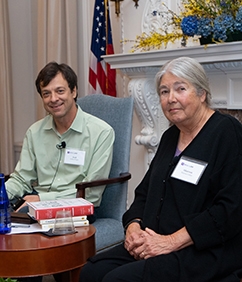Frontiero v. Richardson plaintiff discusses gender equality 50 years after the landmark Supreme Court case
On September 27, in a Life of the Law conversation at NYU Law, journalist and author Joshua Prager spoke with Sharron Cohen, formerly Sharron Frontiero, a plaintiff in the landmark case Frontiero v. Richardson. Part of an ongoing series of discussions focused on the people involved in major Supreme Court cases, the event commemorated the 50-year anniversary of a Supreme Court decision that was a major step toward gender equality in the United States.
In the early 1970s, two federal statutes provided that dependent spouses of members of uniformed services were entitled to certain housing and medical benefits—but when Sharron Frontiero, a lieutenant in the US Air Force, tried to claim her husband as a dependent, she was denied. Under these statutes, a serviceman could claim his wife as a dependent and automatically receive benefits, regardless of a wife’s financial dependency on her husband. However, a servicewoman could only claim her husband as a dependent if she provided 75 percent or more of household income.
Seeking the benefits that had been denied, the Frontieros filed suit, alleging that the statutes discriminated unreasonably on the basis of sex and thus violated the Fifth Amendment’s Due Process Clause. After losing in federal district court, they appealed. Ruth Bader Ginsburg, then a law professor at Columbia University, argued on the Frontieros’ behalf in the Supreme Court as counsel for the American Civil Liberties Union, an amicus curiae. An 8-1 majority of the Court struck down the two statutes.
Watch the video of the event:
Selected remarks by Sharron Cohen:
“I did not start as a feminist. I just wanted my money. So it wasn’t until we filed suit, and then, you know, when you start to see, you don’t unsee.… I credit the lawsuit with teaching me what a bigger world it was and how much more complicated it was. And remember, this was during the second wave of feminism, and everything was happening. There were consciousness raising groups, there were rallies, there were all kinds of feminist things going on, and so I started going…. I became a feminist. And when I die, the last cell that disappears from my body will be a feminist one. I promise you.” (Video, 26:59)
“My version of feminism is that we’re all free to do what we can do, as long as we can support ourselves and not hurt each other. So you know, I shouldn’t have to be what a feminist now tells me a feminist is.” (Video, 47:19)
“I think, 50 years ago, we thought the world was going to be different, and the world is still tough. And it’s still tough because we got number one on the list—we got entrance into the workplace—but we didn’t get anything to support it, like decent childcare or elder care, or anything that would support that. And the culture is still there, and it’s more subtle and harder to define…. Instead of wounds, what we [women] have is a hundred little paper cuts…. A lot of women, I found out, carry a certain amount of anger that the world is not more equitable and more safe, like we had wanted it to be 50 years ago.” (Video, 1:08:37)
Posted on October 30, 2023


